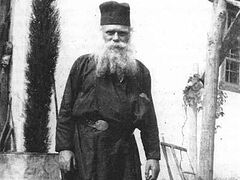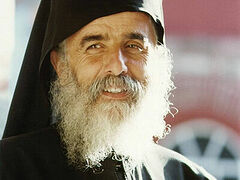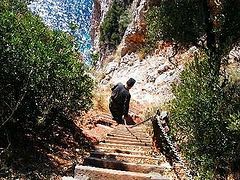Without any warning, unceremoniously, Fr. Stefanos would come to our monastery at least a couple times a year. Because he changed his places of residence on Mt. Athos many times, he could be called a “wanderer”—using a worldly term. However, here, on the Holy Mountain, we call such monks “circling”—that is, circling Mt. Athos. Some elders say of such monks that they were tied to the top of Mt. Athos with a rope, and now they are free to walk wherever they please—within Mt. Athos, of course.
Thus, Fr. Stefanos is one of those monks wandering all over Mt. Athos. Every time he turns up at our monastery, we rejoice. He bears no imprint of modern culture, and this attracts many to him. We shower him with all sorts of questions and are amazed at his simple and unexpected answers. Among other things, he is a chanter of the old school. His powerful voice tunes the soul to praise and thanksgiving to God. You want to sing along, and your heart is filled with delight and joy.
In recent years, he lost vision in his fleshly eyes, and so we sing the beginnings for him of the troparia and stichera, which he loves most of all. However, we will stop dwelling on our personal impressions in the introduction and will move on to the talk that we had with him.
—Fr. Stefanos, your blessing!
—God bless!
—How are you doing?
—I am not okay.
—And what about your boldness?
—Eh, so-so.
—What is the matter?
—Well, you are asking the same questions, too! Can’t you see? I am advanced in years! I have reached the age of eighty-one. I am sick, but, by the grace of God, I still keep going, I take care of myself. This is how I live. What else can I do? I fell down the stairs, from a height of thirteen feet.
—When? Where?
—In the cell. Two years ago.
—And did you hurt yourself?
—Oh-ho-ho! And how badly! But St. Athanasios of Mt. Athos saved me. There are two staircases there. I immediately felt bad and lost consciousness, but an invisible force came to my aid. I prayed before the icon of the Mother of God “Portaitissa”, which is kept at the Iveron Monastery. I was just returning from there; I had gone there to bow down before this icon. And when I came to the Russikon (St. Panteleimon’s Monastery), someone told me, “Don’t go to the skete of Xenophontos Monastery on foot because it is very hot now and you may get sunstroke.” “Yes, all right,” I replied and stayed there. But you know, father, I avoided that temptation because God wrote me into His book.
—Aren’t you suffering from pride, and isn’t that why you fell?
—Oh, what pride? I’m a sinful person too! Our Lord Jesus Christ alone is without sin. Isn’t that true? And you know, I don’t even understand what pride is. And these things often occur due to the temptation of the enemy. I don’t see why I should be proud. What would be the reason? I am a simple ascetic!
—Or maybe it seems to you that you have gifts of grace, and therefore you fall into pride.
—What? Gifts of grace? What gifts? Please tell me! I am a monk—what gifts of grace can I have? These gifts are for bishops and patriarchs, and not for us.
—And how do you live here in your kaliva?
—God knows how! After all, He is the Master here, together with St. Athanasios of Mt. Athos! Do you get it? Of course, I feel bad in the state I am in now. What do you want me to do, Fr. Damascene? Despair? That mustn’t be done! Never! I just say, “May Thy will be done, my God,” And that’s it! Is there any other way to cross the sea of this life? We must obey Him alone. There is no other Father and no other Doctor. And the Mother of God is our consolation. She is with God, She is after God, and She receives from Him whatever She asks for. So I give thanks to the Mother of God and Her Son. Now I have firewood for this coming winter, but I cannot chop it. I told the abbot of Grigoriou Monastery to let me stay here. After all, I am a Gregoriatis too. I was tonsured by Abbot Vissarionos many years ago.
—Fr. Stefanos, where were you born?
—In Asia Minor, in the village of Sarti. When there was a population exchange between Greece and Turkey in 1921, my parents moved here, stayed in Halkidiki and founded the village of New Sarti.
—And how many children did your parents have?
—One child who was taken by God, and me. So, two of us.
—What were your parents’ names? Were they devout Christians?
—Of course they were! My father’s name was Efstratios, and my mother’s... Oh, what was her name? I always forget it! Oh, her name was Eleftheria! I remember the name thanks to a market in Thessaloniki.
—What made you want to become a monk?
—Listen! I was twenty years old. This decision was from God. It was His will, and if God wants something, nothing can stop you. There were two hieromonks in the skete of Xenophontos Monastery. I lived with them for several years, and then they both died. The Mother of God did not want them to stay here. The Lord tells us, Enter ye in at the strait gate (Mt. 7:13).
—And which gate is strait?
—This is the path of sorrows and troubles. We must accept what hurts and grieves us in monastic life, and walk the straight path that leads to the Kingdom of Heaven.
—Can we hope that we will be saved?
—He who lives according to the will of God can... Let us pray a little so we do not move off the path... We need a lot of attention because we are monks and we have taken the monastic vows before our Lord—they must be fulfilled. Therefore, as the Lord says, He that entereth not by the door into the sheepfold, but climbeth up some other way, the same is a thief and a robber (Jn. 10:1).
—Father Stefanos, how long have you been here on the Holy Mountain?
—For sixty years. I came to Mt. Athos at the age of twenty.
—How have you lived these sixty years?
—God knows... I am waiting for only one thing—deliverance.
—Are you afraid of death?
—I’m afraid because I’ve also made mistakes. But we have the Mother of God. She hears our prayers, and Her Son listens to Hers, and He will not remember the small mistakes that we make. If you are good, there is no death for you. Death is falling asleep, it is joy; therefore it is called passing to life from what saddens us in earthly life. But woe to him who departs this life unprepared! Remember what the Lord said about Lazarus, Our friend Lazarus sleepeth; but I go, that I may awake him out of sleep (Jn. 11:11).
—And how did you feel when you were in the Holy Land?
—I was at the service at the Church of the Holy Sepulcher. I celebrated the Liturgy with Patriarch Diodoros I.1 There were so many people there... Oh... Oh... Thousands of people! The church was packed. It was built by St. Helen. It was on April 15, 1990,2 when I went there. I felt very good there, thank God! At the last moment, I was also honored to see the Holy Light of the Resurrection, and the thirty-three candles that I was holding flared up in my hands. I brought them to my face and my beard—they did not burn at all. For half an hour, the flame was cool and shone with an immaterial light. Before the descent of the Holy Light, all the candles and lamps in the church had been put out. And then, when the Holy Light came down, they all lit up by themselves. What a miracle it was, brother, what a miracle! Do you see what Orthodoxy is? Do you see what the truth of Christianity is?
The Paschal Liturgy was celebrated there on a slab from the Holy Sepulcher. I also celebrated the Liturgy with the Patriarch at that time. Many priests gathered from everywhere. What joy it was! What feelings! Do you understand?
—And which saints do you especially revere, Fr. Stefanos?
—All the saints are one body, my father. I don’t despise anyone. They endured everything for the love of God. I love them all with all my heart. They are like one family. What else can I say? I cannot love one saint and hate another. I love all the saints. And who should I despise? Please tell me who?
—Which saints have especially helped you in your life?
—I don’t know. I know that when I fell down the stairs, St. Athanasios of Mt. Athos came and helped me. There was no one to raise me up. The place was deserted, and even if I started shouting no one would have heard me.
—And where did you receive the tonsure into the Great Schema, my father?
—Here, on the Holy Mountain—in the garden of the Most Holy Theotokos—in the Kaliva of St. Charalampios of New Skete. At that time, Fr. Athanasios was the abbot of the cell. He came from the Danielaioi Brotherhood.
—And how can we acquire humility, humility of mind?
—Don’t you read sacred books? Don’t you read the Philokalia? Don’t you read the Lives of the Saints? Your abbot is good at talking about all this. Do you have any doubts? The abbot is above all else. Who am I? What can I tell you? I’m the most sinful of all men! We must take the Holy Fathers and follow their example.
—What have you learned over these sixty years on Mt. Athos?
—We came here to acquire the Heavenly Kingdom. We have books to read. Once the administration of the Holy Mountain suggested that I go to a bishop outside the Mountain to serve with him. I answered them, “Dear fathers! Your Eminence! I cannot leave the Mountain. I will stay here to guard the holy peninsula. I am absolutely unfit for the Kingdom of Heaven and for life in the world. But now—such as I am—I am waiting for news from Heaven. Holy God knows when to send me this news.”
—Are you ready for this call from above?
—It is up to God to decide, and He knows when the time will come to send me a message. After all, no one can say that he is ready. God alone knows when to call each of us. Even before we were born, we were already in the counsel of God, in His thoughts, in His will. St. Simeon Metaphrastes also says, “All my deeds are recorded in Thy book.” Do you know it? Eh, you know a lot more! So we will do all we can, and God will accept us. We are children of God, and He will not leave us! Christ will not condemn us, but our deeds will condemn us if they are not according to His will. But what can I say? You and your brotherhood know everything better than I do!
—And what advice would you give, Father Stefanos, to a young monk?
—Oh, my child, I see there are many young monks at your monastery. However, we need to be brothers not in the flesh, but in the spirit, and so we will follow the path of the Lord. And what is this path? Good deeds! Patience, unshakable love, faith and mutual help—and God will bless our labors and grant what we want. In addition, let us constantly have the desire to fulfill the vows of the monastic schema. This schema is the path that leads to life.
—And how can we repent and love God?
—We can do it by a good life, a spiritual life. Here on Mt. Athos let us be vigilant—and the Lord will bless us. Do you remember what He says? Enter ye in at the strait gate. That is, through deprivation, need, hunger, difficult conditions and troubles.






